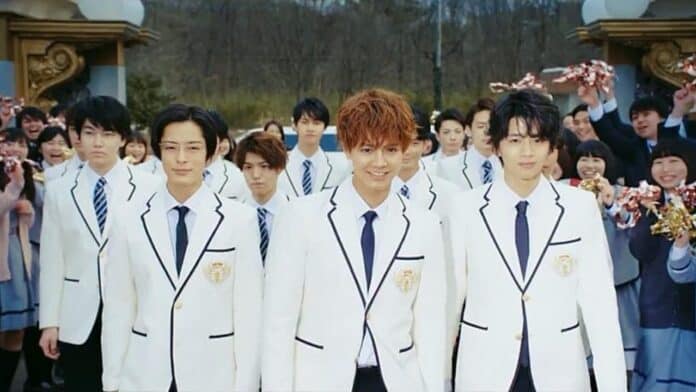Prince of Legend is a Japanese college drama in which 14 princes battle out with each other for the prestigious ‘Prince of Legend’ title. It is now streaming on Netflix.
Story
The St. Brilliant Academy holds a championship for the ‘Prince of Legend’ title every three years. A deserving prince is chosen for the honour.
At his father’s request, the wealthy celebrity prince Kanade Suzaku reaches St. Brilliant Academy looking for Naruse Kanon, his father’s daughter from another woman. He is accompanied by his loyal aides and quickly falls in love with the girl.
A rejection of his proposal puts him at odds with Naruse Kanon. Soon, he discovers about his half-brother Takato Kyogoku too. Kanade’s father asks both his heirs to make Naruse Kanon fall in love with them as he wants to see her happy. In return, he offers them his wealth.
Hesitatingly, both the princes agree. But soon they discover they are not the only ones trying to win over Naruse Kanon. From the student council chairman to the English teacher, all develop a keen interest in Naruse Kanon.
All the men, who are princes in their own right, join the bandwagon to win Naruse Kanon’s heart. In the end, Naruse Kanon comes up with a rather surprising demand leaving all the princes puzzled
Performances
All the main cast members play the part given to them quite aptly.
Ryôta Katayose plays the wealthy and sometimes tantrum-throwing Kanade Suzaku with some naivety. His expressions are probably the most exaggerated from the main cast but he fits the part. Nobuyuki Suzuki (Takato Kyogoku) plays his rival brother quite well barring some inconsistencies in the acting.
The star of the main cast is undoubtedly Sei Shiraishi who plays Naruse Kanon, a character with limited dialogues making the character mostly dependent on the actor’s expression to convey her feelings.
Akihisa Shiono (Seiichiro Kuon), Hiroki Iijima (Gen Kaburagi), Reo Sano (Aoi Ayanokoji), Keita Machida (Riichi Yuki) and Shô Kiyohara (Haru Sagasawa) all perform remarkably well.
Another well-deserved mention must go to Kazuma Kawamura who plays Takato’s brother Ryu, a character conflicted between his feelings for Kanon and loyalty towards Takato. Ryô Katô steals the show with his comedic performance for the role of Mitsuhiko Jissoji, the chancellor of St. Brilliant Academy.
Positives
The series has the unmistakable touch of the Japanese anime style. The narration, camera movements, frame placements, music, characterization, and cool character introductions, all work rhythmically to provide the feel of an anime film through a live-action series.
Each episode follows the background of a certain main character while plugging the character into the storyline. The episodes remain consistently interesting as more and more characters keep getting introduced, adding to the conflict.
The series blends situational and romantic comedy to conjure up a constantly evolving storyline that keeps the viewer on a hook. The absurdity at times is also supported by world-building.
The background score packs a powerful punch changing tones and rhythms with the situations and scenes. The editing deserves appreciation as it neatly weaves the different plot threads and presents a clear picture of the developing story.
Negatives
The abundance of characters does not help the situation with the short 20-minute episodic format. As the focus keeps shifting from each character to the other, along with being difficult to keep track of, it leaves little opportunity to properly explore any character.
The character of Naruse Kanon, the pivot around which all the events take place, barely receives a character arc. Her perspective receives the least attention as the list of guys contesting for her continues to grow. Among things that have received less attention, the importance of consent will find a place too. Some lazy, convenient writing will make it a trio.
The motivations of the character are clearly sillier than the situation at play. Amplified by the lack of emotional depth most characters show at most times, it’s nearly impossible to connect with any character if the natural charm and good looks of the characters are ignored.
The very few occasions when a sliver of hope of establishing some ground with a character’s life emerges, the series loses itself again. Some really interesting subplots are introduced and left unexplored and unaddressed.
Verdict
A roster of charmingly handsome guys, a couple of consistently flattered girls, and remarkably absurd comedy make Prince of Legend a popcorn watch that neither takes a lot of time to finish nor leaves with much thought to ponder. The first impression remains etched – entertaining while it lasts and forgettable once over.
Rating: 2.5/5
Also Read: Prince of Legend (2018) summary and ending explained

